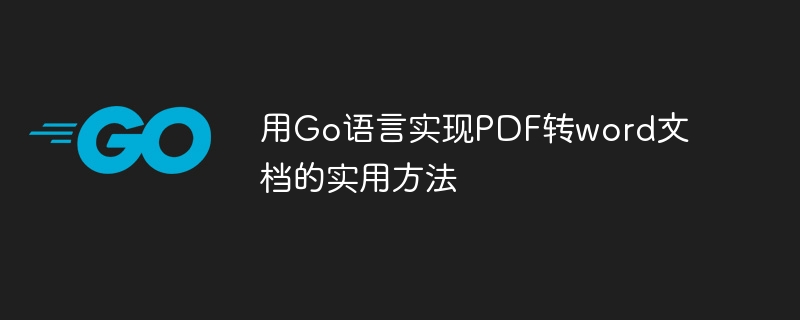

PDF and Word are two commonly used document formats, in different scenarios There are different uses below. Documents in PDF format have the advantages of good cross-platform compatibility, high security, and easy storage and transmission, while documents in Word format have the advantages of strong editability, easy modification and formatting, etc. Therefore, in some cases, it is necessary to convert PDF documents to Word documents.
Go language is an open source, compiled, and general-purpose programming language with simple syntax, excellent performance, and strong cross-platform capabilities. The Go language provides a wealth of libraries and tools that can easily convert PDF to Word documents.
First, we need to install dependent libraries. You can use the following command to install:
go get github.com/unidoc/unipdf/v2 go get github.com/unidoc/unioffice/v3
In the Go file that needs to use the PDF to Word document function, import the dependent library:
import (
"github.com/unidoc/unipdf/v2/extractor"
"github.com/unidoc/unioffice/v3"
"github.com/unidoc/unioffice/v3/common"
"github.com/unidoc/unioffice/v3/document"
)Use unipdf library to read PDF document:
pdfReader, err := extractor.NewPdfReader(pdfFile)
if err != nil {
// Handle error
}
defer pdfReader.Close()Use unioffice library Create Word document:
wordDoc := unioffice.NewDocument()
Use unipdf and unioffice libraries to convert PDF document content For the Word document content:
pages, err := pdfReader.GetPages()
if err != nil {
// Handle error
}
for _, page := range pages {
text, err := page.GetText()
if err != nil {
// Handle error
}
paragraph := wordDoc.AddParagraph()
paragraph.AddRun().AddText(text)
}Save the Word document locally:
err = wordDoc.SaveToFile(wordFile)
if err != nil {
// Handle error
}package main
import (
"github.com/unidoc/unipdf/v2/extractor"
"github.com/unidoc/unioffice/v3"
"github.com/unidoc/unioffice/v3/common"
"github.com/unidoc/unioffice/v3/document"
)
func main() {
// Read PDF document
pdfFile := "path/to/input.pdf"
pdfReader, err := extractor.NewPdfReader(pdfFile)
if err != nil {
// Handle error
}
defer pdfReader.Close()
// Create Word document
wordDoc := unioffice.NewDocument()
// Convert PDF document content to Word document content
pages, err := pdfReader.GetPages()
if err != nil {
// Handle error
}
for _, page := range pages {
text, err := page.GetText()
if err != nil {
// Handle error
}
paragraph := wordDoc.AddParagraph()
paragraph.AddRun().AddText(text)
}
// Save Word document
wordFile := "path/to/output.docx"
err = wordDoc.SaveToFile(wordFile)
if err != nil {
// Handle error
}
}The above is a practical method to convert PDF to Word document using Go language. I hope this article can help you easily convert PDF to Word documents.
The above is the detailed content of A practical method to convert PDF files to Word documents in Go language. For more information, please follow other related articles on the PHP Chinese website!
 What are the office software
What are the office software
 How to change word background color to white
How to change word background color to white
 How to delete the last blank page in word
How to delete the last blank page in word
 Why can't I delete the last blank page in word?
Why can't I delete the last blank page in word?
 Word single page changes paper orientation
Word single page changes paper orientation
 word to ppt
word to ppt
 Word page number starts from the third page as 1 tutorial
Word page number starts from the third page as 1 tutorial
 Tutorial on merging multiple words into one word
Tutorial on merging multiple words into one word




